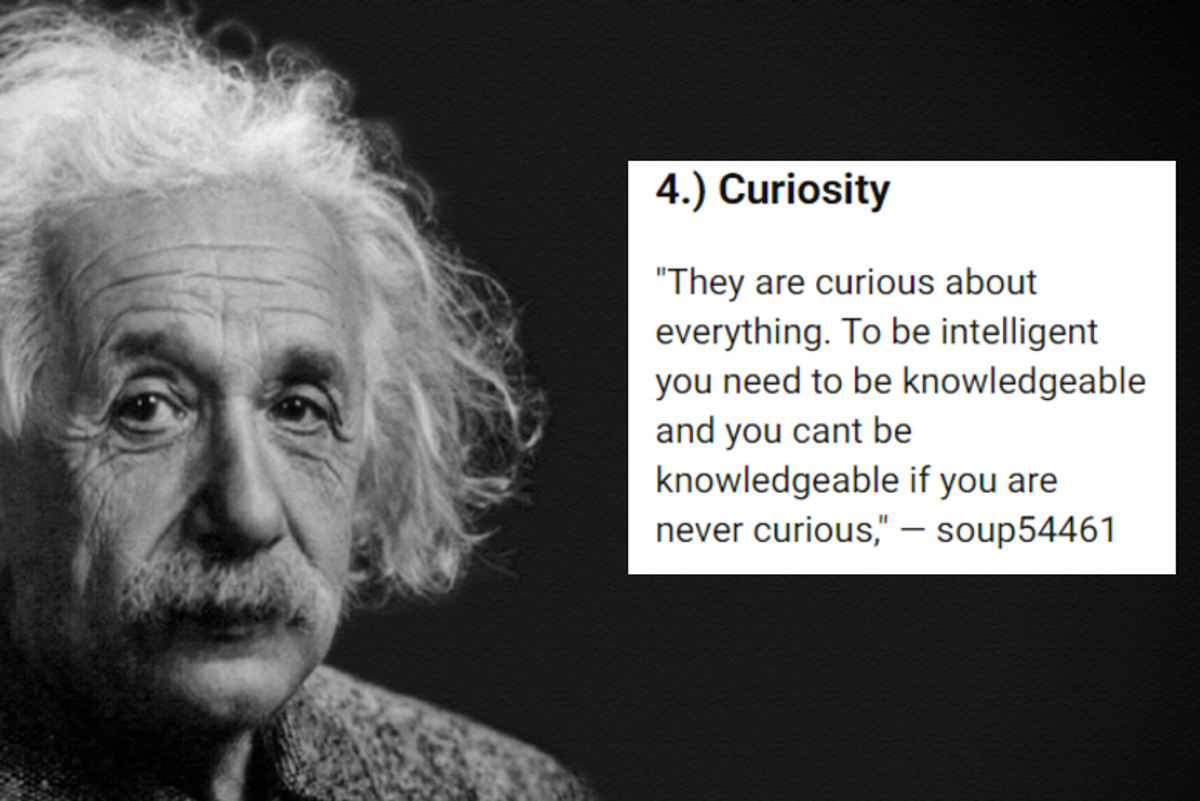People share the 18 things that are a 'subtle sign' someone is really smart
"They effortlessly communicate complex concepts in a simple way."

Albert Einstein
One of the strangest things about being human is that people of lesser intelligence tend to overestimate how smart they are and people who are highly intelligent tend to underestimate how smart they are.
This is called the Dunning-Kruger effect and it’s proven every time you log onto Facebook and see someone from high school who thinks they know more about vaccines than a doctor.
The interesting thing is that even though people are poor judges of their own smarts, we’ve evolved to be pretty good at judging the intelligence of others.
“Such findings imply that, in order to be adaptive, first impressions of personality or social characteristics should be accurate,” a study published in the journal Intelligence says. “There is accumulating evidence that this is indeed the case—at least to some extent—for traits such as intelligence extraversion, conscientiousness, openness, and narcissism, and even for characteristics such as sexual orientation, political ideology, or antigay prejudice.”
Reddit user Gisgiii posed a question to the AskReddit subforum: “What is a subtle sign that someone is really intelligent?”
The answers painted a clear picture of how smart people behave: They tend to be great communicators who understand their audience and are more concerned with getting things right than being right.
Here are 18 of the best answers.
1. They draw wisdom from multiple sources.
"They draw wisdom from multiple sources. Wait but that might be more wise than intelligent... But I guess those two tend to be seen together a lot," — Puzzlehead-Engineer
2. They know their audience.
"They can switch up the way they talk to match the person they're talking to without sounding condescending. They listen to how others learn and explain it in that person's language of understanding," — Wynonna99
3. They develop a keen sense for their job.
"I used to work with a doctor - Tom Howard - and the day I realized he was a genius was the time he guessed every single condition a patient of mine had based on minute pieces of information about him," — Yodei_Mon
4. Curiosity.
"They are curious about everything. To be intelligent you need to be knowledgeable and you can't be knowledgeable if you are never curious," — soup54461
5. They're great at conveying ideas.
"When they explain something they make you feel intelligent," — gwoshmi
6. Considerate questions.
"They spend time thinking before asking a question," — ParkMan73
7. They make hard ideas simple.
"They effortlessly communicate complex concepts in a simple way," — joculator
8. They know what they don't know.
"They know when their knowledge ends and say something to the extent of 'i don't know and anything else i say on this topic is ignorant speculation,'" — blutoboy
9. They ask great questions.
"They can ask really good questions."
"Edit: to anyone not understanding what mean, I’m talking about people who ask “really good questions”, not just any questions, really good ones. I don’t know how one would achieve this skill(I know I haven’t)," — milkmanbran
10. They don't pretend to know everything.
"They aren’t afraid to say they don’t know the answer to a question," — xchernx
11. They change their minds with new information.
"They admit to changing their mind about something," — FarAwayAdventure
12. They pivot well.
"They apply knowledge from one realm into a new and relevant situation," — soubestitch
13. They are open-minded.
"They can genuinely consider an idea which opposes their worldview without necessarily accepting it," — paidshill29
14. They use analogies.
"People who use analogies to explain concepts to others. It’s a form of code-switching and integrating concepts on the fly and is a clear indicator someone is both socially and conceptually intelligent," — SwimmerAutomatic2488
15. They don't argue.
"I think intelligent people are more willing to calmly debate/discuss, rather than argue. Like, you explain to them why you disagree, and they listen to you and ask further questions about your viewpoint before offering a different perspective; as opposed to an unintelligent person, who would just resort to insults when other people disagree with them," — AngelicCinnamonBun
16. They learn from mistakes.
"Admitting when they're wrong and being willing to learn from mistakes," — siyl1979
17. A sense of humor.
"Humor. I think that truly funny people are often very smart and cognizant of the different ways an idea can be humorous on several levels. They also know their audience. I think the difference between say a Jeff Foxworthy and a Dave Chappelle and a Bo Burnham is their audience and their interests," — biscuitboi967
18. A love of learning.
"They say they love learning and they learn something new every day. Then they listen more than talk," — throwingplaydough
- You may suffer from 'impostor syndrome.' Lots of smart people with ... ›
- A lighthearted, simple matrix explains whether someone is ... ›
- Octopus intelligence: Here are 13 of the most frighteningly smart ... ›
- What makes someone a genius? - Upworthy ›
- 15 subtle signs someone is very smart - Upworthy ›
- People share their most 'interesting' roommate stories. - Upworthy ›
- The subtle sign that someone isn't very bright - Upworthy ›
- Oxford professor says octopuses will rule Earth after humans. - Upworthy ›
- 15 'subtle' signs that someone is highly intelligent - Upworthy ›
- How do you know someone is very smart? Here are 15 'subtle signs' others notice. - Upworthy ›
- What are the 'non-obvious' signs someone is really intelligent? People notice these 15. - Upworthy ›
- The YAS method to sound smart in conversations - Upworthy ›
- Aristotle's dead giveaway of knowing you have a 'great mind' - Upworthy ›









 Cats can be finicky about how they're held.
Cats can be finicky about how they're held.  Squish that cat.
Squish that cat. 
 A man getting golf lessons.via
A man getting golf lessons.via  Students learning sigh language.via
Students learning sigh language.via 
 A woman reading a book.via
A woman reading a book.via A woman tending to her garden.via
A woman tending to her garden.via
